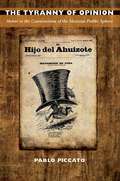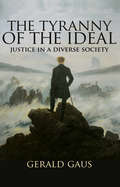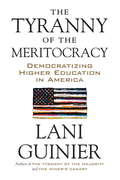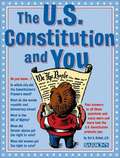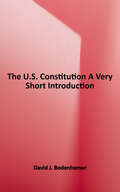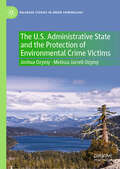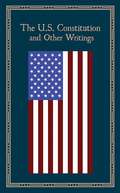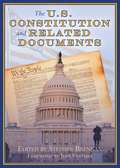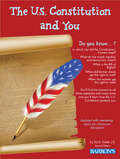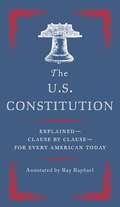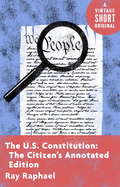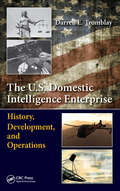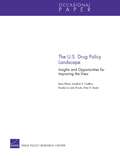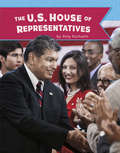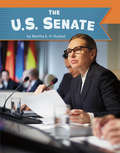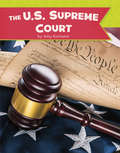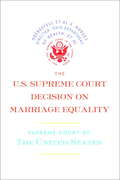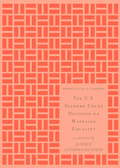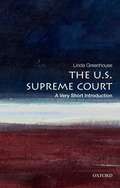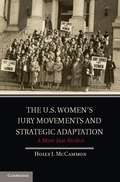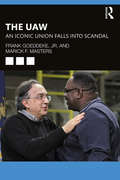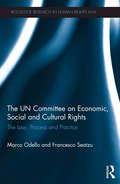- Table View
- List View
The Tyranny of Opinion: Honor in the Construction of the Mexican Public Sphere
by Pablo PiccatoIn the mid-to-late nineteenth century, as Mexico emerged out of decades of civil war and foreign invasion, a modern notion of honor--of one's reputation and self-worth--became the keystone in the construction of public culture. Mexicans gave great symbolic, social, and material value to honor. Only honorable men could speak in the name of the public. Honor earned these men, and a few women, support and credit, and gave civilian politicians a claim to authority after an era dominated by military heroism. Tracing how notions of honor changed in nineteenth-century Mexico, Pablo Piccato examines legislation, journalism, parliamentary debates, criminal defamation cases, personal stories, urban protests, and the rise and decline of dueling in the 1890s. He highlights the centrality of notions of honor to debates over the nature of Mexican liberalism, describing how honor helped to define the boundaries between public and private life; balance competing claims of free speech, public opinion, and the protection of individual reputations; and motivate politicians, writers, and other men to enter public life. As Piccato explains, under the authoritarian rule of Porfirio Daz, the state became more active in the protection of individual reputations. It implemented new restrictions on the press. This did not prevent people from all walks of life from defending their honor and reputations, whether in court or through violence. The Tyranny of Opinion is a major contribution to a new understanding of Mexican political history and the evolution of Mexican civil society.
The Tyranny of Values and Other Texts
by Carl Schmitt David Pan Samuel Zeitlin Russell BermanWritten during the Weimar Republic, the Nazi era, and the Cold War, this collection of occasional pieces provides an instructive look at the ways in which Carl Schmitt employed his theories in order to make judgments about contemporary historical events and problems. Covering topics such as the political significance of universalism and jurisprudence, the meaning of the partisan, the world-historical significance of the Cold War, the deterioration of metaphysics into "values," the relationship between theoretical concepts and concrete historical situations, and his views on thinkers such as Machiavelli, Bodin, and Rousseau, these essays establish a revealing counterpoint to his more formal work. They react on the one hand directly to contemporary political questions and demonstrate the way in which he saw the immediate historical significance of his ideas. On the other hand, he also feels free to provide in these pieces the kinds of methodological reflections that help us to better understand the particular epistemological framework that makes his thought so unique.
The Tyranny of the Ideal: Justice in a Diverse Society
by Gerald GausIn his provocative new book, The Tyranny of the Ideal, Gerald Gaus lays out a vision for how we should theorize about justice in a diverse society. Gaus shows how free and equal people, faced with intractable struggles and irreconcilable conflicts, might share a common moral life shaped by a just framework. He argues that if we are to take diversity seriously and if moral inquiry is sincere about shaping the world, then the pursuit of idealized and perfect theories of justice--essentially, the entire production of theories of justice that has dominated political philosophy for the past forty years--needs to change.Drawing on recent work in social science and philosophy, Gaus points to an important paradox: only those in a heterogeneous society--with its various religious, moral, and political perspectives--have a reasonable hope of understanding what an ideally just society would be like. However, due to its very nature, this world could never be collectively devoted to any single ideal. Gaus defends the moral constitution of this pluralistic, open society, where the very clash and disagreement of ideals spurs all to better understand what their personal ideals of justice happen to be.Presenting an original framework for how we should think about morality, The Tyranny of the Ideal rigorously analyzes a theory of ideal justice more suitable for contemporary times.
The Tyranny of the Meritocracy
by Lani GuinierA fresh and bold argument for revamping our standards of "merit" and a clear blueprint for creating collaborative education models that strengthen our democracy rather than privileging individual elitesStanding on the foundations of America's promise of equal opportunity, our universities purport to serve as engines of social mobility and practitioners of democracy. But as acclaimed scholar and pioneering civil rights advocate Lani Guinier argues, the merit systems that dictate the admissions practices of these institutions are functioning to select and privilege elite individuals rather than create learning communities geared to advance democratic societies. Having studied and taught at schools such as Harvard University, Yale Law School, and the University of Pennsylvania Law School, Guinier has spent years examining the experiences of ethnic minorities and of women at the nation's top institutions of higher education, and here she lays bare the practices that impede the stated missions of these schools. Goaded on by a contemporary culture that establishes value through ranking and sorting, universities assess applicants using the vocabulary of private, highly individualized merit. As a result of private merit standards and ever-increasing tuitions, our colleges and universities increasingly are failing in their mission to provide educational opportunity and to prepare students for productive and engaged citizenship. To reclaim higher education as a cornerstone of democracy, Guinier argues that institutions of higher learning must focus on admitting and educating a class of students who will be critical thinkers, active citizens, and publicly spirited leaders. Guinier presents a plan for considering "democratic merit," a system that measures the success of higher education not by the personal qualities of the students who enter but by the work and service performed by the graduates who leave. Guinier goes on to offer vivid examples of communities that have developed effective learning strategies based not on an individual's "merit" but on the collaborative strength of a group, learning and working together, supporting members, and evolving into powerful collectives. Examples are taken from across the country and include a wide range of approaches, each innovative and effective. Guinier argues for reformation, not only of the very premises of admissions practices but of the shape of higher education itself.From the Hardcover edition.
The U. S. Constitution And You
by Syl Sobel Denise GilgannonAll elementary school students learn about the history of the U. S. Constitution when they first begin social studies. This book is different. It tells boys and girls about the great American document itself -- explaining exactly what the Constitution does, as well as how it affects and protects people today. Kids discover how the Constitution provides for the federal government's three branches -- legislative, executive, and judicial. Then they see how it gives all citizens many rights, including the right to vote, to enjoy freedom of speech and the press, to worship - or not worship - according to one's religious beliefs, to disagree openly with government policy, and to defend oneself in courts of law when accused of crimes or civil wrongs. Kids also see how, according to the Constitution, many rights are kept beyond control of the federal government, and are reserved for the separate states, communities, and individuals. This book's language is clear and simple. It cites many examples that relate directly to each student's own experiences.
The U. S. Constitution: A Very Short Introduction (Very Short Introductions)
by David J. BodenhamerThough the U.S. Constitution was ratified in 1788, its impact on our lives is as recent as today's news. Claims and counterclaims about the constitutionality of governmental actions are a habit of American politics. This document, which its framers designed to limit power, often has made political conflict inevitable. It also has accommodated and legitimized the political and social changes of a vibrant, powerful democratic nation. A product of history's first modern revolution, the Constitution embraced a new formula for government: it restrained power on behalf of liberty, but it also granted power to promote and protect liberty. <p><p>The U.S. Constitution: A Very Short Introduction explores the major themes that have shaped American constitutional history: federalism, the balance of powers, property, representation, equality, rights, and security. Informed by the latest scholarship, this book places constitutional history within the context of American political and social history. As our nation's circumstances have changed, so has our Constitution. <p><p>Today we face serious challenges to the nation's constitutional legacy. Endless wars, a sharply divided electorate, economic inequality, and immigration, along with a host of other issues, have placed demands on government and on society that test our constitutional values. Understanding how the Constitution has evolved will help us adapt its principles to the challenges of our age. <p><p>ABOUT THE SERIES: The Very Short Introductions series from Oxford University Press contains hundreds of titles in almost every subject area. These pocket-sized books are the perfect way to get ahead in a new subject quickly. Our expert authors combine facts, analysis, perspective, new ideas, and enthusiasm to make interesting and challenging topics highly readable.
The U.S. Administrative State and the Protection of Environmental Crime Victims (Palgrave Studies in Green Criminology)
by Joshua Ozymy Melissa Jarrell OzymyThis accessible book provides the first comprehensive analysis of environmental crime victims within criminal prosecutions in the United States. By combining empirical analysis of criminal investigations undertaken by the U.S. Environmental Protection Agency from 1983-2022 with narrative discussion of numerous related criminal prosecutions, it provides novel insights to help advance a stronger empirical understanding of how the administrative state protects victims of environmental harm, punishes environmental offenders, and aids in furthering the development of an environmental victimology.
The U.S. Constitution and Other Writings (Leather-bound Classics)
by Editors of Thunder Bay Press Kenneth C. Mondschein“We the People of the United States, in order to form a more perfect union . . . ” — The U.S ConstitutionThe U.S. Constitution and Other Writings is part of the Leather-bound Classics series and is a collection of the crucial documents, speeches, and other writings that shaped the United States. In addition to the Constitution, readers can review the Declaration of Independence, the Articles of Confederation, the Federalist Papers, important presidential speeches, and many others. Both famous and lesser-known, but equally important, Americans are represented, including Benjamin Franklin, Victoria Woodhull, Frederick Douglass, Susan B. Anthony, and even the creators of the rules of baseball. The founders' inspirational and revolutionary ideals are all here, and this is a perfect volume for anyone who finds the history of America to be a fascinating and enlightening journey.
The U.S. Constitution and Related Documents
by Jesse Ventura Stephen BrennanNo matter who you identify with—Democrat or Republican, Tea Party or Green Party, Independent or something else altogether—we the people should read: The Constitution of the United States of America The Bill of Rights and all of the Amendments The Declaration of Independence The Articles of ConfederationTake a moment or two to reflect on the words of our forefathers, as these are the documents literally created America. The Constitution set up a system of government that remains centuries later. The eloquent words of The Declaration of Independence are an enduring statement of human rights. Written and signed by Benjamin Franklin, Thomas Jefferson, George Washington, and other great lights of our historical past, these documents define our freedoms and promise us our futures. And while they are often quoted, they are seldom actually read. Here is an opportunity to reach a new audience, with a fresh design and the same inspiring words. This collection will be a welcome addition to any American who believes in the dream.
The U.S. Constitution and You
by Syl Sobel J.D.This easy-to-read book about the United States for kids brings history and social studies classes to life as readers learn about the U.S. Constitution. Here is a book that will be valued by teachers and enjoyed by young students.Parents, teachers, and gift givers will find:a clear explanation of the Constitutionvocabulary words that align with curriculuma book that makes the Constitution relevant to kids' livesDo you know how the U.S. Constitution works to protect you, your friends, and your family? It gives you and every American citizen many rights including the right to vote, as well as to enjoy freedom of speech, freedom of the press, freedom to worship—or not worship—according to your beliefs, to disagree openly with government policy, and to defend yourself in courts of law. You'll learn about our rights as a citizen...and also learn which rights are reserved for the state and the community where you live.
The U.S. Constitution: Explained for Every American
by Ray RaphaelPoliticians come and go, but the Constitution stands as the supreme law of the land. Setting forth the workings of our democracy, it is the bedrock document from which we derive our policies on topics as diverse and galvanizing as immigration, gun ownership, voting rights, taxation, policing, civil liberties, and war. In this indispensable edition, acclaimed historian and Constitutional expert Ray Raphael guides us through the origins, impact, and current relevance of the original text and all twenty-seven amendments. Here is the key historical context for issues in the news today—from the Electoral College to Washington gridlock, from peaceful protests to executive power. Thoughtful and nuanced, lively and highly readable, this annotated Constitution is for all of us to read and refer to—the ultimate political fact-checking source for every American.
The U.S. Constitution: The Citizen's Annotated Edition
by Ray RaphaelA Vintage Shorts Original Selection As Khizr Khan dramatically demonstrated at this year's Democratic National Convention, the U.S. Constitution is the central point of reference in our political debates--the bedrock document from which we derive our policies on topics as diverse and galvanizing as immigration, gun ownership, voting rights, taxation, policing, and war. It dictates the structure and workings of our government; it sets forth our rights as citizens and, as such, shapes the parameters of our lives. Presidents come and go, but the Constitution remains the supreme law of the land. In this essential edition, acclaimed historian Ray Raphael guides us through the Constitution clause by clause and amendment by amendment, illuminating the origins of its content, the intentions of its framers, its evolution throughout the centuries, and its meaning today. Thoughtful and nuanced, lively and highly readable, this Constitution is for all of us to read and refer to--the ultimate political fact-checking source for every American. An ebook short
The U.S. Domestic Intelligence Enterprise: History, Development, and Operations
by Darren E. TromblayMuch has been written about U.S. intelligence operations. However, intelligence, as it is conducted in the U.S. domestic environment, has usually been treated in a fractured and sensationalistic manner. This book dispassionately assesses the U.S. domestically oriented intelligence enterprise by first examining its individual components and then sho
The U.S. Drug Policy Landscape: Insights and Opportunities for Improving the View
by Peter H. Reuter Beau Kilmer Rosalie Liccardo Pacula Jonathan P. CaulkinsDiscussions about reducing the harms associated with drug use and antidrug policies are often politicized, infused with questionable data, and unproductive. This paper provides a nonpartisan primer on drug use and drug policy in the United States. It aims to bring those new to drug policy up to speed and provide ideas to researchers and potential research funders about how they could make strong contributions to the field.
The U.S. Experience with No-Fault Automobile Insurance
by James M. Anderson Paul Heaton Stephen J. CarrollNo-fault regimes, a formerly popular alternative to the tort compensation system for auto-accident victims, have gradually lost support. Over time, premiums and claim costs have grown in no-fault states relative to other states, primarily driven by explosive medical cost increases. No-fault and tort states have also converged across many domains affecting costs, including excess claiming, litigation patterns, and noneconomic-damage payments.
The U.S. House of Representatives (U.S. Government)
by Amy KortuemHow does the U.S. House of Representatives work? Discover who can be a representative, what they do, where they work, and more. Descriptive main text, full-color photos, fast facts, and callout definitions work together to support understanding.
The U.S. Senate (U.S. Government)
by Martha E. RustadWhat is the U.S. Senate? Learn about senators, how bills become laws, where senators work, and more. Descriptive main text, full-color photos, fast facts, and callout definitions work together to support understanding.
The U.S. Supreme Court (U.S. Government)
by Amy KortuemWhat does the U.S. Supreme Court do? Learn about who can be on the Supreme Court, how they are chosen, where they work, and more. Descriptive main text, full-color photos, fast facts, and callout definitions work together to support understanding.
The U.S. Supreme Court Decision on Marriage Equality
by Supreme Court of the United StatesThe complete text of the landmark Supreme Court decision on marriage equality The 2015 Supreme Court decision Obergefell et al. v. Hodges legalized gay marriage across the United States. This edition collects the widely quoted decision by Justice Kennedy, as well as the dissents of Justices Roberts, Scalia, Thomas, and Alito. Of tremendous interest to general readers and students of American history, The U.S. Supreme Court Decision on Marriage Equality is a milestone in the history of human and civil rights. It is an essential document of our times.From the Trade Paperback edition.
The U.S. Supreme Court Decision on Marriage Equality, Gift Edition
by Anthony M. KennedyA beautifully packaged gift edition of Obergefell et al. v. Hodges, Justice Anthony Kennedy's landmark Supreme Court decision on marriage equality A milestone in the history of American civil and human rights, Obergefell et al. v. Hodges legalized gay marriage across the United States. A powerful testament to the progress of human and civil rights, The U.S. Supreme Court Decision on Marriage Equality is an essential document of our times.From the Hardcover edition.
The U.S. Supreme Court: A Very Short Introduction
by Linda GreenhouseFor 30 years, Pulitzer Prize-winning journalist Linda Greenhouse chronicled the activities of the U. S. Supreme Court and its justices as a correspondent for the New York Times. In this Very Short Introduction, she draws on her deep knowledge of the court's history and of its written andunwritten rules to show readers how the Supreme Court really works. Greenhouse offers a fascinating institutional biography of a place and its people - men and women - who exercise great power but whose names and faces are unrecognized by many Americans and whose work often appears cloaked in mystery. How do cases get to the Supreme Court? How do the justices goabout deciding them? What special role does the chief justice play? What do the law clerks do? How does the court relate to the other branches of government? Greenhouse answers these questions by depicting the justices as they confront deep constitutional issues or wrestle with the meaning ofconfusing federal statutes. Throughout, the author examines many individual Supreme Court cases to illustrate points under discussion, ranging from Marbury v. Madison, the seminal case which established judicial review, to the recent District of Columbia v. Heller (2008), which struck down the District of Columbia'sgun-control statute and which was, surprisingly, the first time in its history that the Court issued an authoritative interpretation of the Second Amendment. To add perspective, Greenhouse also compares the Court to foreign courts, revealing interesting differences. For instance, no other country inthe world has chosen to bestow life tenure on its judges. A superb overview packed with telling details, this volume offers a matchless introduction to one of the pillars of American government.
The U.S. Women'S Jury Movements and Strategic Adaptation
by Holly J. MccammonWhen women won the vote in the United States in 1920 they were still routinely barred from serving as jurors, but some began vigorous campaigns for a place in the jury box. This book tells the story of how women mobilized in fifteen states to change jury laws so that women could gain this additional right of citizenship. Some campaigns quickly succeeded; others took substantially longer. The book reveals that when women strategically adapted their tactics to the broader political environment, they were able to speed up the pace of jury reform, while less strategic movements took longer. A comparison of the more strategic women's jury movements with those that were less strategic shows that the former built coalitions with other women's groups, took advantage of political opportunities, had past experience in seeking legal reforms, and confronted tensions and even conflict within their ranks in ways that bolstered their action.
The UAW: An Iconic Union Falls into Scandal
by Marick F. Masters Frank Goeddeke, Jr.This book analyzes the multi-faceted scandal that has tarnished the reputation of the United Auto Workers (UAW), an iconic union revered for its commitment to union democracy and ethical practices, showing what went wrong to lead the spread of corruption and how to remedy it. Masters and Goedekke provide a historical context of the rise and decline of the UAW, leading to "a culture of corruption" and resulting in the indictment or conviction of 15 union and corporate officials for the misuse of tens of millions of dollars. The book evaluates the various proposed reforms of the UAW's financial practices and ethical standards, including the possibility of a government takeover. It raises questions about the wisdom of such a takeover, based on the problems associated with the government takeover of the Teamsters. The authors recommend that the UAW convene a special constitutional convention to consider reforms in governance and hiring practices. Providing a clear depiction of this scandal and the UAW’s systemic flaws, and suggesting potential remedies, this book will appeal to the tens of thousands of union officers and members keenly interested in the state of labor and an iconic union, their corporate counterparts in management, academics, students, and journalists in the fields of business and society, employee relations, law, labor relations, and management.
The UN Committee on Economic, Social and Cultural Rights: The Law, Process and Practice (Routledge Research In Human Rights Law Ser.)
by Marco Odello Francesco SeatzuThe book concerns the study and analysis of the UN Committee on Economic, Social and Cultural Rights from an international legal perspective, taking into consideration the adoption of the 2008 Optional Protocol to the International Covenant on Economic, Social and Cultural Rights (ICESCR).The volume provides a detailed account of the structure and functioning of the Committee on Economic, Social and Cultural Rights in the light of its jurisprudence, through a study of the Committee’s procedures and practices (periodic reports and general comments), including taking into account the Optional Protocol for individual complaint procedure. The book considers the possible implications of the work of this Committee on other UN Committees, such as the Human Rights Committee and the UN Committee on the Rights of the Child, as well as considering the repercussions of its work on the international protection of fundamental rights, such as the right to education, to health and adequate food.The UN Committee on Economic, Social and Cultural Rights will be of particular interest to academics and students of International and Human Rights law.
The UN Convention on Contracts for the International Sale of Goods: Theory and Practice
by Clayton P. Gillette Gillette, Clayton P. and Walt, Steven D. Steven D. WaltUpdated and expanded for the second edition, this volume provides attorneys, academics and students with a detailed yet accessible overview of the United Nations Convention on Contracts for the International Sale of Goods (CISG). Adopted by more than eighty nations and governing a significant portion of international sales, the CISG regulates contract formation, performance, risk of loss, conformity to contractual requirements and remedies for breach. This volume explains the CISG doctrines and their ambiguities, and appraises the extent to which the doctrines reduce transaction costs for commercial actors. Its topic-based approach will be ideal for those pursuing academic analysis or subject-specific research.
